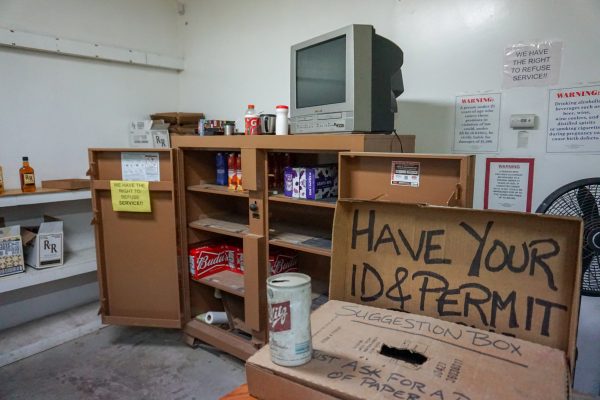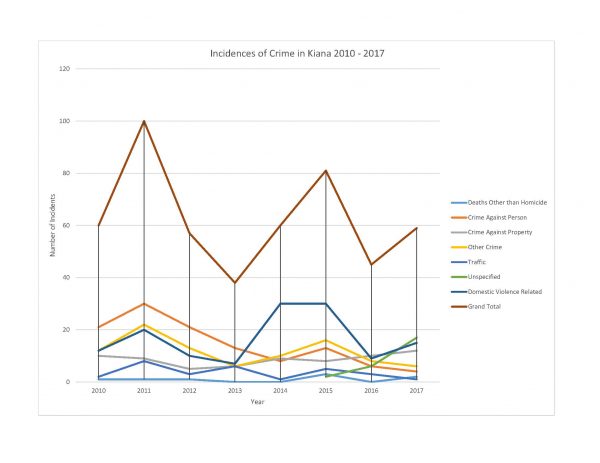
The Solutions Desk looks beyond Alaska’s problems and reports on its solutions – the people and programs working to make Alaska communities stronger. Listen to more solutions journalism stories and conversations, and share your own ideas here.
A group of middle school cheerleaders stands in the bleachers of the Kiana school gym in late winter. They don’t have coordinating outfits but their words ring out in synch to a relatively quiet gym.
“Hey you, that’s our ball!” they shout at the opposing basketball team, willing the Kiana Lynx to take it back.
After the game, the kids talk over each other trying to explain life in the village beyond cheering.
“We always play out,” says one girl.
“And go skiing,” interjects another.
“And then we always go out for walks and have fun,” finishes the first.
That’s what they do when they leave the gym around 8 pm that night. They wander through the village of about 370 people on foot and on ski, but this time, two of the kids come across two men who had been drinking. The kids escorted the stumbling men home.
The next morning Danielle Douglas reflects on her evening.
“Two people were drunk and they barely could even walk,” she says.”I do not like them when they are drunk.”
Danielle says it makes her feel sad and unsafe but she wanted to walk them home so they wouldn’t get cold and stay outside in the snow. She and her friends had seen a moose in the area earlier that day, too, and worried the men might run into it.
Danielle blames the controversial liquor store. She says it causes people to be drunk all the time. Some people agree with her. Others don’t.
[Related: Bethel’s AC Quickstop liquor store shuts down]
Kiana voted to allow for local alcohol sales in 2009 and about two years later, people could import a limited amount of alcohol through a distribution center. Then, in 2014, the city-run package store opened with limited sales. The store is open 2 hours per day except for Wednesday and Sunday. It’s also closed during school events and times of bereavement.
Every year people have to pay $100 for a permit to shop there and get a background check. If you have a felony or can’t drink while on probation then you can’t get a permit.
Kiana Mayor Dale Stutts says there are about 45 people with permits in the village. And there’s another provision – they have to pay off all of their water, sewer, and power bills.
“If they can’t meet their other bills, they are not welcome to go shopping in that store,” he says. “So a little harsh you might say, but it works.”
Stutts says people have paid off long overdue accounts, and that’s just one of the positive effects of the store. The alcohol sales tax has also funded a new youth center.
“It’s something that we’ve been trying to achieve for a number of years, and we felt that with that income, we had a really good chance of fulfilling that dream for the kids,” he says.
The council has given out small amounts for scholarships and burials, too. But Stutts says they haven’t made much money, in part because the store has been vandalized and broken into.
“We’ve suffered losses from theft in the liquor store, and damage to the building during the breaking-and-entering process, which of course detracts from any positive bottom line that the store would have made,” he says.

Public perception is there’s been more crime and domestic violence in general since the store opened. Data from the Department of Public Safety shows that there was a spike in the number of incidents in 2011, the year the distribution center opened, then it dropped. There was a smaller spike in 2015, after the liquor store opened, but the number has dropped again.
Resident Nellie Schuerch says the problem is that alcohol is more accessible and visible – people are drinking more openly and at home. She says it traumatizes the kids, and a youth center won’t fix that.
“What happens at home impacts the kids, I mean for life,” she says. “We can do without a teen center.”
People shopping at the package store the weekend of the basketball game didn’t want to talk on record about buying alcohol because drinking is so stigmatized in the village. But they said they see the benefits of legal sales. People don’t spend as much money on bootlegged liquor, they say. And it helps teach moderate drinking habits – people are less likely to binge drink because they know it will always be available.
Nellie says that’s not what she sees in Kiana, the village where she grew up. “There may be responsible drinkers out there, but I haven’t seen one yet.”
But she also doesn’t think banning alcohol entirely is the right answer. Nellie says the village needs a middle ground. They should get rid of the liquor store but still allow people to import limited amounts of alcohol.
“Prohibition never did work. It will never work,” she says. “If a person wants to drink, they’ll find a way to get it.”
But the liquor store isn’t going anywhere anytime soon. The city’s license was just renewed and is good through 2019.
Want to hear more Solutions Desk stories? Subscribe to the podcast on iTunes, Stitcher, Google Play, or NPR.
After being told innumerable times that maybe she asked too many questions, Anne Hillman decided to pursue a career in journalism. She's reported from around Alaska since 2007 and briefly worked as a community radio journalism trainer in rural South Sudan.
ahillman (at) alaskapublic (dot) org | 907.550.8447 | About Anne




